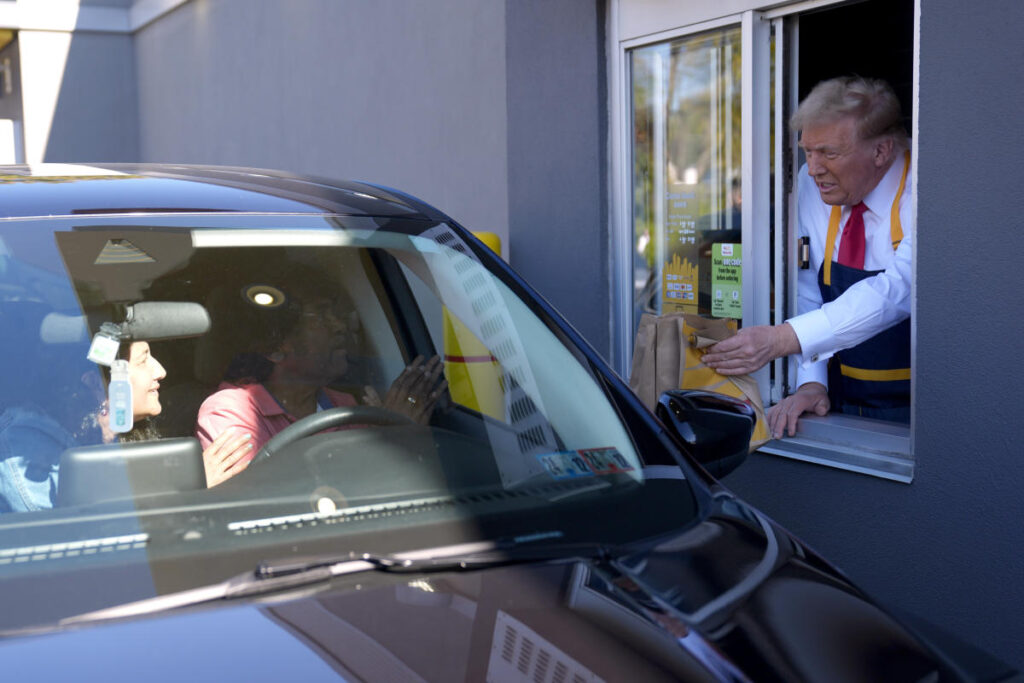McDonald’s Corp. recently hosted former President Donald Trump at a Pennsylvania franchise, where he engaged in activities such as staffing the fry station and answering customer inquiries through the drive-thru window. Despite this high-profile visit, the global fast-food company clarified that it does not endorse any candidates in the upcoming U.S. presidential race, emphasizing its commitment to openness and inclusivity. The decision to host Trump came from the restaurant’s owner-operator, Derek Giacomantonio, who welcomed the opportunity after learning of Trump’s interest in visiting a McDonald’s. In a communication directed to employees, McDonald’s reiterated its stance: “We are not red or blue – we are golden,” affirming that it remains apolitical during election cycles.
In its message, McDonald’s highlighted its historical connection to political figures, mentioning that franchisees had also extended invites to Vice President Kamala Harris and her running mate, Gov. Tim Walz. This situation has generated a noteworthy discourse, with Harris referencing her past experience working at McDonald’s during her college years while campaigning. The fast-food giant remained neutral on the narrative surrounding her claims, noting with pride the connection many Americans have to their brand and service experience, exemplified by the familiar statistic that one in eight Americans has worked at McDonald’s at some point in their lives.
However, Trump’s visit drew mixed reactions, particularly on social media, where there was a notable spike in searches for “boycott McDonald’s.” Critics expressed their displeasure over the event, with some users on platforms like Twitter declaring they would refrain from patronizing the restaurant chain. The implications of hosting a divisive political figure like Trump raise valid concerns for corporations like McDonald’s, particularly regarding consumer backlash. Chris Hydock, a marketing professor at Tulane University, pointed out the inherent risks for major brands associated with polarizing personalities, asserting that negative sentiments from those opposed to Trump’s candidacy could have a more significant impact than any potential benefit.
Conversely, Lori Rosen, president of the public relations firm Rosen Group, suggested that McDonald’s stands to gain more than it loses from the media attention surrounding Trump’s visit. She noted that the publicity and discussions arising from the event could outweigh the negative sentiments expressed on social media. This notion suggests that, for large corporations, being at the center of public discourse—regardless of the nature of that discourse—can be beneficial for brand visibility and relevance.
In agreement with this perspective, Bruce Newman, a business ethics and marketing professor at DePaul University, noted that by opening its doors to Trump, McDonald’s positioned itself in the limelight of the political conversation. The company appeared as an appealing venue for candidates, enhancing brand awareness among consumers. Newman also observed that Trump’s casual appearance at the franchise, donned in a worker’s apron instead of formal attire, was likely a strategic move aimed at softening his campaign image and connecting with everyday Americans.
Ultimately, the event raises critical questions about the intersection of business and politics. While McDonald’s asserts its neutrality, the decision to host a former president, especially one as polarizing as Trump, illustrates the complex dynamics companies navigate during election cycles. As franchising and corporate branding continue to intertwine with political engagement, the implications of such events on consumer perception, brand loyalty, and long-term corporate reputation will likely continue to be a topic of analysis among marketing professionals and business ethicists alike. Whether such a strategy proves to be a gambit that pays off in the long run remains to be seen, especially as the political landscape evolves and consumer sentiments shift.

